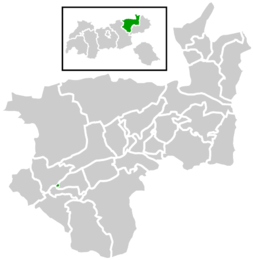Rattenberg
 From Wikipedia the free encyclopedia
From Wikipedia the free encyclopedia
This article needs additional citations for verification. (July 2008) |
Rattenberg Råttnberg | |
|---|---|
 Rattenberg | |
 Location within Kufstein district | |
| Coordinates: 47°26′20″N 11°53′36″E / 47.43889°N 11.89333°E | |
| Country | Austria |
| State | Tyrol |
| District | Kufstein |
| Government | |
| • Mayor | Bernhard Freiberger (FPÖ) |
| Area | |
| • Total | 0.11 km2 (0.04 sq mi) |
| Elevation | 521 m (1,709 ft) |
| Population (2018-01-01)[2] | |
| • Total | 411 |
| • Density | 3,700/km2 (9,700/sq mi) |
| Time zone | UTC+1 (CET) |
| • Summer (DST) | UTC+2 (CEST) |
| Postal code | 6240 |
| Area code | +43 5337 |
| Vehicle registration | KU |
| Website | www.rattenberg.at |
Rattenberg (Bavarian: Råttnberg) is a City on the Inn River in the Austrian state of Tyrol near Rattenberg mountain and Innsbruck. With just 400 inhabitants and a surface area of 10 ha, it is the smallest city in the country.
Geography
[edit]The proximity of a mountain to the south of the town means that Rattenberg, like many villages nested in steep sided valleys throughout the Tyrol region of the Alps, receives no direct sunlight for much of the winter. It is one of the few places at a significant southerly latitude that experiences a prolonged period without direct sunlight (another is Viganella, Italy), although the sky remains bright while the town is in the mountain's shadow so there is no permanent darkness or 'polar night' as experienced north of the Arctic Circle.
Gallery
[edit]- View to the town with former monastery and churchtower
- Churchtower (Katholische Pfarrkirche Sankt Virgil)
- Church: Spitalkirche Heilige Geist
- Street view Haussauerstrasse
History
[edit]Founded in the 14th century, it was built in the literal shadow of Rat Mountain to protect itself from marauders. Maximilian I had the original town citadel expanded to a formidable fortress.[3]
The modern era
[edit]In November 2005, the town announced they were building 30 specialized rotating mirrors called heliostats to reflect sunlight into parts of the town during the winter months.[4] The $2.4 million operation was suggested by Bartenbach Lichtlabor GmbH, a lighting design company. The EU planned to foot half the bill as of November 2005.[4] However, the project was never implemented.
Population
[edit]| Year | Pop. | ±% |
|---|---|---|
| 1869 | 679 | — |
| 1880 | 727 | +7.1% |
| 1890 | 737 | +1.4% |
| 1900 | 752 | +2.0% |
| 1910 | 711 | −5.5% |
| 1923 | 701 | −1.4% |
| 1934 | 742 | +5.8% |
| 1939 | 676 | −8.9% |
| 1951 | 879 | +30.0% |
| 1961 | 745 | −15.2% |
| 1971 | 652 | −12.5% |
| 1981 | 590 | −9.5% |
| 1991 | 526 | −10.8% |
| 2001 | 436 | −17.1% |
| 2011 | 405 | −7.1% |
Economy
[edit]
Rattenberg has been known for its glass making. Its abundance of crystal glass shops continue the tradition of craftsmanship.[5]
See also
[edit]- Rjukan, Norway and Viganella, Italy - other valley settlements that endure a prolonged lack of direct winter sunlight.
References
[edit]- ^ "Dauersiedlungsraum der Gemeinden Politischen Bezirke und Bundesländer - Gebietsstand 1.1.2018". Statistics Austria. Retrieved 10 March 2019.
- ^ "Einwohnerzahl 1.1.2018 nach Gemeinden mit Status, Gebietsstand 1.1.2018". Statistics Austria. Retrieved 9 March 2019.
- ^ Chizzali. Tyrol: Impressions of Tyrol. (Innsbruck: Alpina Printers and Publishers), p. 2
- ^ a b "Mirrors shed light as winter grips small town". Independent Online. 2005-11-18. Archived from the original on 2006-06-14.
- ^ Chizzali, p. 42
External links
[edit]





